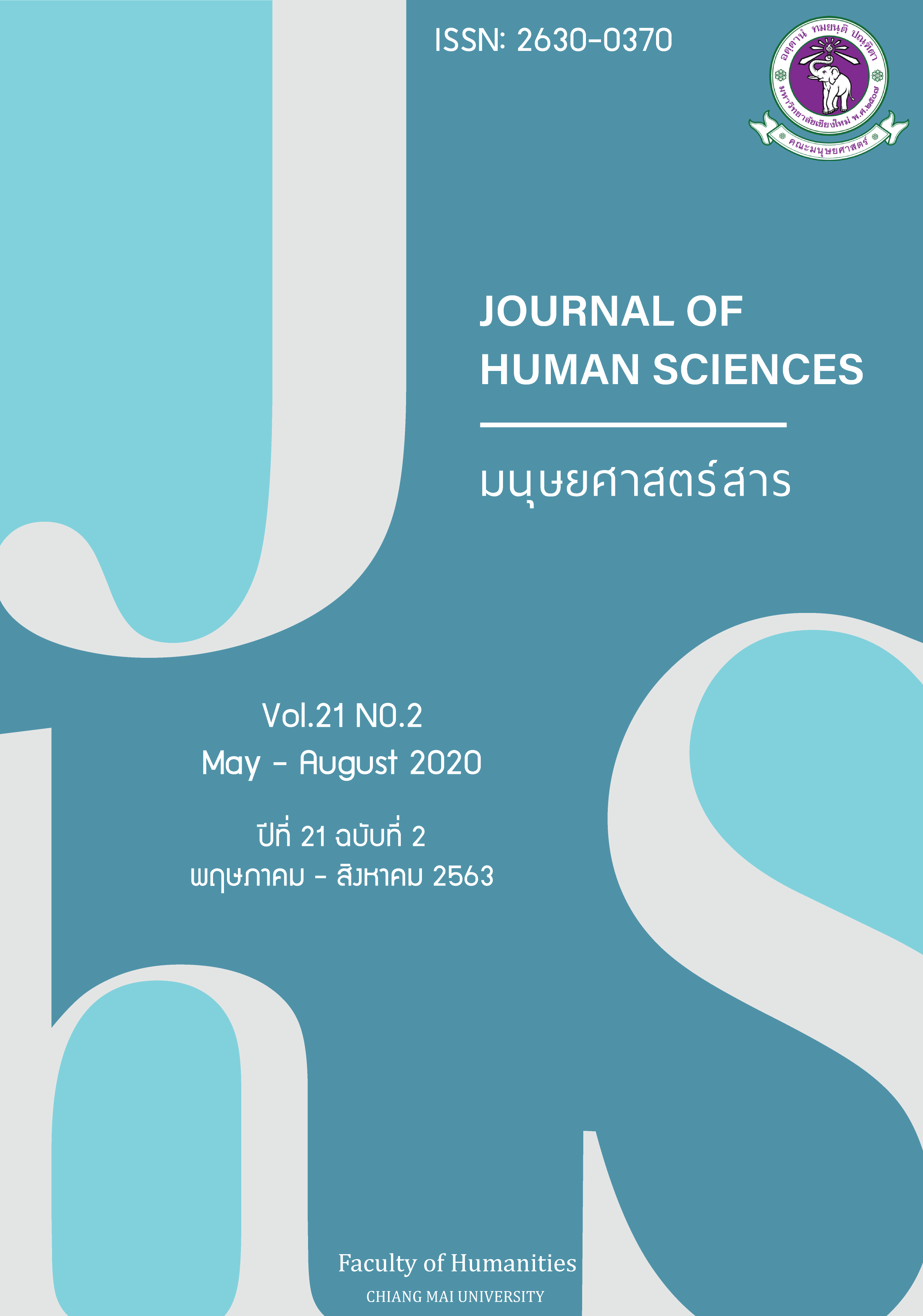อิทธิพลของความเมตตากรุณาต่อตนเองที่มีต่อความกรุณาต่อผู้อื่นและความสุขของจิตอาสาในกรุงเทพมหานครและเขตปริมณฑล
Main Article Content
บทคัดย่อ
การวิจัยครั้งนี้มีวัตถุประสงค์เพื่อศึกษาอิทธิพลของความเมตตากรุณาต่อตนเองที่มีต่อความกรุณาต่อผู้อื่นและความสุขของจิตอาสาในกรุงเทพมหานครและเขตปริมณฑล กลุ่มตัวอย่างที่ใช้ในการศึกษาคือจิตอาสาในหน่วยงานภาครัฐและเอกชน จำนวน 441 คน เครื่องมือที่ใช้ในการวิจัยครั้งนี้ ประกอบด้วย แบบสอบถามความเมตตากรุณาต่อตนเอง แบบสอบถามความกรุณาต่อผู้อื่น และแบบสอบถามความสุข การวิเคราะห์ข้อมูลใช้การวิเคราะห์ความสัมพันธ์โครงสร้างเชิงสาเหตุ ผลการวิจัยพบว่า โมเดลอิทธิพลของความเมตตากรุณาต่อตนเองมีต่อความกรุณาต่อผู้อื่นและความสุขของจิตอาสาในกรุงเทพมหานครและเขตปริมณฑลสอดคล้องกับข้อมูลเชิงประจักษ์ โดยเส้นอิทธิพลมีนัยสำคัญทางสถิติที่ระดับ .05 ทุกตัวแปร ซึ่งตัวแปรที่ส่งผลมากที่สุดต่อความสุขของจิตอาสาในกรุงเทพมหานครและเขตปริมณฑล คือ ความเมตตากรุณาต่อตนเองโดยมีค่าสัมประสิทธิ์อิทธิพลเท่ากับ .59 รองลงมา คือ ความกรุณาต่อผู้อื่นโดยมีค่าสัมประสิทธิ์อิทธิพลเท่ากับ .25 และพบว่า ความเมตตากรุณาต่อตนเองและความกรุณาต่อผู้อื่นสามารถร่วมกันทำนายความแปรปรวนของความสุขได้ร้อยละ 54
Article Details
เอกสารอ้างอิง
Arimitsu, K., Hitokoto, H., Kind, S., & Hofmann, S. G. (2019). Differences in Compassion, Well-being, and Social Anxiety Between Japan and the USA. Mindfulness, 10(5). 854-862.
Boonsrangsom, W. (2013). khwamsamphan rawang kanrapru khwamkhriat læ khwam suk nai nisit naksưksa mahawitthayalai doi mi khwam metta Karuna to toneng pentua præ song phan [The relationship between perceived stress and happiness of university students with self-compassion as a mediator]. (Master's thesis, Chulalongkorn University).
Cassisa, C., & Neff, K. D. (2019). The promise of self-compassion for solos. GPSolo, 36(3). 18-21.
Charoen, S. (1977). phromwihan si [The Four Immeasurables]. Bangkok: Printing House, Suwan Gallery.
Charoen, S. (1989). phromwihan tham [Brahma theology]. Bangkok: Chuan Pim Printing Company.
Charoen, S. (2015). thamma pradap chai [Dharma adorns the heart]. Bangkok: Surawat Printing House.
Erikson, E. H. (1950). Childhood and Society. NY: Norton.
Gale, C., Gilbert, P., Read, N., & Goss, K. (2012). An evaluation of the impact of introducing compassion focused therapy to a standard treatment programme for people with eating disorders. Clinical Psychology and Psychotherapy, 21(1). 1-12.
Hair, J. F., Black, W. C., Babin, B. J., & Andrson, R. E. (2010). Multivariate Data Analysis (7th ed.). New Jersey: Prentice-Hall.
Hollis-Walker, L., & Colosimo, K. (2011). Mindfulness, self-compassion, and happiness in non-meditators: A theoretical and empirical examination. Personality and Individual Differences, 50. 222-227.
Homan, K. J., & Sirois, F. M. (2017). Self-compassion and physical health: Exploring the roles of perceived stress and health-promoting behaviors. Health Psychology Open, 4(2).
Klangphrapan, M. (2003). kanphatthana phromwihan si khong naksưksa wichachip khru sangkat sathaban ratchaphat tam næo phut ruam kap kanrianru duai toneng [A development of the four divine states of teacher students in rajabhat institute based on buddhisy training and self-directed learning]. (Doctoral dissertation, Chulalongkorn University).
Kline, R. B. (2010). Principles and practices of structural equation modeling (3rd ed.). NY: Guilford Press.
Kraus, S., & Sears, S. (2009). Measuring the Immeasurables: Development and Initial Validation of the Self-Other Four Immeasurables (SOFI) Scale Based on Buddhist Teachings on Loving Kindness, Compassion, Joy, and Equanimity. Social Indicators Research, 92(1). 169-181.
Meyer, A., Moran, C., Fitzpatrick, T., Ernst, J., & Körner, A. (2018). Oncology Volunteers: The Effect of a Personal Cancer History on Compassion and Psychological Well-Being. Clinical Journal of Oncology Nursing, 22(4). 398-406.
Muris, P., Otgaar, H., Meesters, C., Heutz, A., & Hombergh, M. V. D. (2019). Self-compassion and Adolescents’ Positive and Negative Cognitive Reactions to Daily Life Problems. Journal of Child and Family Studies, 28(5). 1433-1444.
Neff, K. D. (2003a). The Development and validation of a scale to measure self-compassion. Self and Identity, 2. 223-250.
Neff, K. D. (2003b). Self-Compassion: An Alternative Conceptualization of a Healthy Attitude Toward Oneself. Self and identity, 2. 85-102.
Neff, K. D., & Germer, C. K. (2013). A Pilot Study and Randomized Controlled Trial of the Mindful Self-Compassion Program. Journal of Clinical Psychology, 69(1). 28-44.
Neff, K. D., & Pommier, E. (2013). The Relationship between Self-compassion and Other-focused Concern among College Undergraduates, Community Adults, and Practicing Meditators. Self and Identity, 12(2). 160-176.
Neff, K. D. (2015). Self-compassion (6th ed.). US: William Morrow & CO.
Nhat Hahn, T. (1991). Old path white clouds: Walking in the footsteps of the Buddha. Berkeley, CA: Parallax Press.
Payutto, P. A. (2011). khwam suk thukngæthukmum (Phim khrang thi 4) [Every aspect of happiness (4th ed.)]. n.p.
Payutto, P. A. (2016). photchananukrom phut sat Chabappramuantham (Phim khrang thi 34) [Buddhist Dictionary of Buddhist editions (34th ed.)]. Retrieved from https://goo.gl/g9rJXC
Phongvarin, C. (2011). khwam suk khong nisit naksưksa nai boribot phut tham : kansưksa khomun choeng prachak læ kanphatthana mat wat [Happiness of university students in the context of Buddha Dhamma: empirical investigation and scale development]. (Doctoral dissertation, Chulalongkorn University).
Pommier, E., Neff, K. D., & Toth-kiraly, I. (2019). The Development and Validation of the Compassion Scale. Assessment, 27(1). 21-39.
Rabon, J. K., Sirois, F. M., & Hirsch, J. K. (2017). Self-compassion and suicidal behavior in college students: Serial indirect effects via depression and wellness behaviors. Journal of American College Health, 66(2). 114-122.
Safarzadeh, K. & Wallmark, E. (2011). The Four Immeasurables Program: Training empathy and promoting altruism through meditation. An eight-week randomized controlled pilot study (Master thesis, Lund University. Sweden).
Salazar, L. R. (2015). Exploring the relationship between compassion, closeness, trust, and social support in same-sex friendships. The Journal of Happiness & Well-Being, 3(1). 15-29.
Seangdoung, N. (2017). senthang kanthamngan asa læ rupbæp khwamsamphan chœng sahet khong phruttikam asa thi song phon to kan khong yu nai kanthamngan asa khong bukkhalakon mahawitthayalai rat [Volunteering and the Causal Relationship Model of Volunteering Behavior and the Retention of Volunteer Work among Public University Staff]. (Doctoral dissertation, Srinakharinwirot University).
Smeets, E., Neff, K. D., Alberts, H., & Peters, M. (2014). Meeting suffering with kindness: Effects of a brief self-compassion intervention for female college students. Journal of Clinical Psychology, 70(9). 794-807.
Srisa-ard, B. (1998). withikan thang sathiti samrap kanwichai lem nưng (Phim khrang thi song) [Statistical Methods for Research, Volume 1 (2nd ed.)]. Bangkok: Suwiriyasarn.
Suksawat, J., & Tuicomepee, A. (2009). prasopkan khwamrunræng kan phachœn panha læ khwam suk nai changwat chaidæn phak tai khong Thai: kanwichai namrong bæp phasan withi [Violent experiences, coping with problems and happiness in the southern border provinces of Thailand : A preliminary mixed-method research] (Master's thesis, Chulalongkorn University).
Zeng, X., Liao, R., Zhang, R., Oei, T. P., Yao, Z., Leung, F. Y., & Liu, X. (2016). Development of the Appreciative Joy Scale. Mindfulness, 8(2). 286-299.


